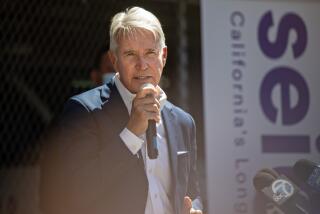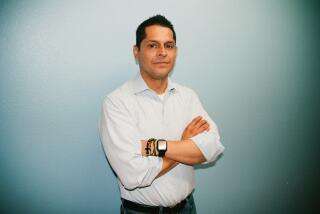THE IRAN-CONTRA HEARINGS : Statement: ‘You Will Not Investigate Yourselves’
\o7 WASHINGTON\f7 — Following are excerpts from Lt. Col. Oliver L. North’s opening statement Thursday at a congressional hearing on the Iran-contra affair:
No Fantasizing
As a member of the NSC (National Security Council) staff, I knew that I held a position of responsibility. But I knew full well what my position was. I did not engage in fantasy that I was the President or vice president or Cabinet member, or even director of the National Security Council. I was simply a staff member with a demonstrated ability to get the job done. Over time, I was made responsible for managing a number of complex and sensitive covert operations that we have discussed here to date. I reported directly to Mr. (Robert C.) McFarlane and to (Vice) Adm. (John M.) Poindexter (former NSC directors). I coordinated directly with others, including (CIA) Director (William J.) Casey. My authority to act always flowed, I believe, from my superiors. . . .
I believe that this is a strange process that you are putting me and others through. . . . You put the testimony which you think is helpful to your goals up before the people and leave others out. It’s sort of like a baseball game in which you are both the player and the umpire. It’s a game in which you call the balls and strikes and where you determine who is out and who is safe. And in the end you determine the score and declare yourselves the winner.
From where I sit, it is not the fairest process. One thing is, I think, for certain--that you will not investigate yourselves in this matter. There is not much chance that you will conclude at the end of these hearings that the Boland amendments (barring U.S. aid to the Nicaraguan contras) and the frequent policy changes therefore were unwise or that your restrictions should not have been imposed on the executive branch. You are not likely to conclude that the Administration acted properly by trying to sustain the freedom fighters in Nicaragua when they were abandoned, and you are not likely to conclude by commending the President of the United States, who tried valiantly to recover our citizens and achieve an opening that is strategically vital--Iran. . . .
I would not be frank with you if I did not admit that the last several months have been difficult for me and my family. It has been difficult to be on the front pages of every newspaper in the land day after day, to be the lead story on national television day after day, to be photographed thousands of times by bands of photographers who chased us around since November. . . . It is difficult to be caught in the middle of a constitutional struggle between the executive and legislative branches over who will formulate and direct the foreign policy of this nation. It is difficult to be vilified by people in and out of this body, some who have proclaimed that I am guilty of criminal conduct even before they heard me. . . .
I believe it is inevitable that the Congress will in the end blame the executive branch, but I suggest to you that it is the Congress which must accept at least some of the blame in the Nicaraguan freedom fighters’ matter. Plain and simple, the Congress is to blame because of the fickle, vacillating, unpredictable, on-again, off-again policy toward the Nicaraguan democratic resistance--the so-called contras. . . .
Armies need food and consistent help. They need a flow of money, of arms, clothing and medical supplies. The Congress of the United States allowed the executive to encourage them to do battle and then abandoned them. The Congress . . . left soldiers in the field unsupported and vulnerable to their communist enemies. When the executive branch did everything possible within the law to prevent them from being wiped out by Moscow’s surrogates in Havana and Managua, you then had this investigation to blame the problem on the executive branch. It does not make sense to me. . . .
I believe that these hearings, perhaps unintentionally so, have revealed matters of great secrecy in the operation of our government. And sources and methods of intelligence activities have clearly been revealed to the detriment of our security. . . .
Inouye’s Response
(Senate Committee Chairman Daniel K. Inouye (D-Hawaii) responded .)
. . . We did not put in testimony words which we thought were helpful to our goals and leave the rest out. I am certain you will agree with me, colonel, that every word you wanted to present to the people of the United States was presented. Isn’t that correct, sir?
North: Yes, Mr. Chairman, it was, and I was not referring to my testimony but that which preceded me, sir--about me.
Inouye: And, secondly, you have suggested that these hearings have disclosed matters of great secrecy. . . . May I once again advise you that, according to the director of the National Security Agency, Gen. (William E.) Odom, not a single bit of classified material has been leaked by activities of this joint panel.
More to Read
Sign up for Essential California
The most important California stories and recommendations in your inbox every morning.
You may occasionally receive promotional content from the Los Angeles Times.










